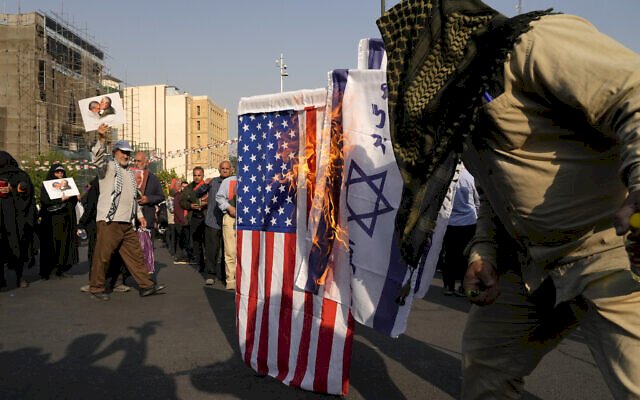US denies Israeli report claiming secret talks with Iran for axis-wide ceasefire

The United States denied an Israeli report Wednesday that it and Arab nations were conducting secret backchannel negotiations with Iran aimed at reaching a comprehensive regional ceasefire with Israel.
The Channel 12 report, which cited second-hand information from unnamed Israeli sources, claimed covert talks were taking place aimed at reaching an agreement to halt attacks on Israel from Tehran-led proxies, including Hezbollah, that have repeatedly launched missiles and drones at Israel in solidarity with Hamas in Gaza.
Asked about the report Wednesday, State Department spokesperson Matthew Miller flatly denied that Washington had any part in or knew of any such initiative.
“No one has reached out to the United States about such a proposal, and we’re not in talks with not in talks with any countries about such a proposal,” Miller said during a press briefing on Wednesday.
“I cannot speak to a hypothetical proposal that I’m not even sure actually exists in reality,” Miller added. “Obviously, we would welcome the end of conflict across the region.”
He stressed the Channel 12 story “was different than actual diplomatic conversations.”
The comments came shortly after Prime Minister Benjamin Netanyahu held a phone call with US President Joe Biden, marking the first time the leaders had spoken in months, and as Iranian Foreign Minister Abbas Araghchi held meetings with key US ally Saudi Arabia.
Miller declined to detail if the US was seeking to send any messages to Aracgchi, who is also set to travel to Qatar, a main mediator in efforts to reach a ceasefire in Gaza. Doha is also the political base for the Hamas terror group, which plunged the region into war when it launched an unprecedented attack on Israel one year ago.
Talks between Biden and Netanyahu were expected to revolve around Israel’s plans to retaliate against Iran for its October 1 ballistic missile attack, amid reports of growing frustration in Washington over Jerusalem’s unwillingness to share details of its intentions.
The US, which has sought to temper Israel’s retaliation, has consistently said it wants to keep the war in Gaza from spilling over into other arenas, but those hopes have withered in recent weeks as Israel and Iranian proxy groups around the Middle East, dubbed the “Axis of Resistance” by Tehran, have traded fire with increasing intensity.
Aside from its offensive against Hezbollah in southern Lebanon launched last month, Israel has also carried out airstrikes against Yemen’s Iran-backed Houthi rebels in retaliation for missile and drone attacks, and has been accused of attacking Iran-backed groups in Syria and Iraq as part of what it has described as a seven-front military engagement.
The Channel 12 report claimed that Israel was not involved in the talks and that it was unclear how they would affect elusive efforts to reach a ceasefire in the Gaza Strip.
An Israeli official quoted by the channel indicated that Jerusalem was keen to press its military advantage against Hezbollah rather than make concessions in a potential ceasefire deal.
“We are currently in a position of power, a ceasefire will be on our terms, including a [Hezbollah] withdrawal beyond the Litani [River] and the dismantling of all military Hezbollah sites in areas near the border,” a senior Israeli official was quoted as saying.
On Wednesday, Channel 12 and the Walla news site reported that Mossad chief David Barnea told his US counterpart that any ceasefire deal with Hezbollah in Lebanon must also include the release of the hostages being held in Hamas.
The reports said the Mossad chief told CIA head Bill Burns that the deals must be linked together. The strategy is reportedly aimed at getting Iran and Hezbollah — who have indicated they are open to a ceasefire in the north — to exert additional pressure on Hamas chief Yahya Sinwar to agree to a deal in Gaza that has proved elusive for many months.
A day earlier, Hezbollah appeared to drop its demand for a truce in Gaza as a condition for reaching a ceasefire in Lebanon, rowing back from an oft-repeated promise to keep up its rocket and drone barrages until Israel halts its offensive against the Lebanese terror group’s Iran-backed ally Hamas.
Hezbollah officials have consistently said they would not stop until Israel ended the conflict in the Strip, but the group has suffered major losses in recent weeks, including airstrikes that have wiped out much of its top leadership.
Naim Qassem, the deputy leader of Hezbollah and its top living official, said he backed efforts by Lebanese parliament speaker Nabih Berri, a Hezbollah ally, to secure a truce — without setting a precondition.
“We support the political activity being led by Berri under the title of a ceasefire,” Qassem said. “If the enemy continues its war, then the battlefield will decide.”
In a follow-up to Qassem’s speech, Hezbollah issued a statement saying it will “not abandon our support and backing for our steadfast Palestinian people in the Gaza Strip.”
Miller said Tuesday that Hezbollah’s call for a ceasefire showed it was “getting battered.”
“For a year, you had the world calling for this ceasefire, you had Hezbollah refusing to agree to one, and now that Hezbollah is on the back foot and is getting battered, suddenly they’ve changed their tune and want a ceasefire,” he said. “We continue to ultimately want a diplomatic solution to this conflict.”





















